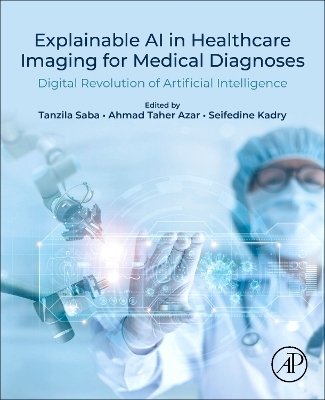
Explainable AI in Healthcare Imaging for Medical Diagnoses
Academic Press Inc (Verlag)
978-0-443-23979-3 (ISBN)
- Noch nicht erschienen (ca. März 2025)
- Versandkostenfrei
- Auch auf Rechnung
- Artikel merken
Tanzila Saba is a Research Professor and Associate Chair of the Information Systems Department in the College of Computer and Information Sciences, Prince Sultan University, Riyadh, KSA. Her primary research focus in recent years is medical imaging, pattern recognition, data mining, MRI analysis, and soft computing. She led more than fifteen research-funded projects. She has full command of various subjects and taught several courses at the graduate and postgraduate levels. She is Senior Member of IEEE. Dr. Tanzila is Leader of Artificial Intelligence & Data Analytics Research Lab at PSU and Active Professional Member of ACM, AIS, and IAENG organizations. She is PSU WiDS (Women in Data Science) Ambassador at Stanford University. Prof. Ahmad Azar has received the M.Sc. degree in 2006 and Ph.D degree in 2009 from Faculty of Engineering, Cairo University, Egypt. He is a research associate Professor at Prince Sultan University, Riyadh, Kingdom Saudi Arabia. He is also an associate professor at the Faculty of Computers and Artificial intelligence, Benha University, Egypt. Prof. Azar is the Editor in Chief of International Journal of System Dynamics Applications (IJSDA) and International Journal of Service Science, Management, Engineering, and Technology (IJSSMET) published by IGI Global, USA. Also, he is the Editor in Chief of International Journal of Intelligent Engineering Informatics (IJIEI), Inderscience Publishers, Olney, UK. Prof. Azar has worked as associate editor of IEEE Trans. Neural Networks and Learning Systems from 2013 to 2017. He is currently Associate Editor of ISA Transactios, Elsevier and IEEE systems journal. Dr. Ahmad Azar has worked in the areas of Control Theory & Applications, Process Control, Chaos Control and Synchronization, Nonlinear control, Renewable Energy, Computational Intelligence and has authored/coauthored over 200 research publications in peer-reviewed reputed journals, book chapters and conference proceedings. He is an editor of many books in the field of fuzzy logic systems, modeling techniques, control systems, computational intelligence, chaos modeling and machine learning. Dr. Ahmad Azar is closely associated with several international journals as a reviewer. He serves as international programme committee member in many international and peer-reviewed conferences. Dr. Ahmad Azar has been a senior member of IEEE since December 2013 due to his significant contributions to the profession. Dr. Ahmad Azar is the recipient of several awards including: Benha University Prize for Scientific Excellence (2015, 2016, 2017 and 2018), the paper citation award from Benha University (2015, 2016, 2017 and 2018). In June 2018, Prof. Azar was awarded the Egyptian State Prize in Engineering Sciences, the Academy of Scientific Research and Technology of Egypt, 2017. In July 2018 he was selected as a member of Energy and Electricity Research council, Academy of Scientific Research, Ministry of Higher Education. In August 2018 he was selected as senior member of International Rough Set Society (IRSS). Prof. Seifedine Kadry’s research focuses on data science, education using technology, system prognostics, stochastic systems, and applied mathematics. He is an ABET (Accreditation Board for Engineering and Technology) Program Evaluator for computing and engineering technology. He is a Fellow of IET, IETE, and IACSIT. He is a distinguished speaker for the IEEE Computer Society.
1. Ensuring Trust in Healthcare Robotics: The Essential Role of Explainable AI
2. XAI implementation in traditional alternate medicine system
3. Explainable Computational Intelligence in Bio and Clinical Medicine
4. Enhancing Medical AI Interpretability Using Heatmap Visualization Techniques
5. An interpretation-model-guided classification method for malignant pulmonary nodule
6. Case Studies: Explainable AI for Healthcare 5.0
7. OML-GANs: An Optimized Multi-Level Generative Adversarial Networks Model for Multi-Omics Cancer Subtype Classification
8. Explainable Artificial Intelligence in Epilepsy Management: Unveiling the Model Interpretability
9. Revolutionizing Cancer Diagnosis with AI-Enhanced Histopathology and Deep Learning: A Study on Enhanced Image Analysis and Model Explainability
10. Unveiling Explainable Artificial Intelligence (XAI) in Advancing Precision Medicine: An Overview
11. Pneumonia and Brain Tumors Diagnosis Using Machine Learning Algorithms
12. Explainable Artificial Intelligence in Medical Research: A Synopsis for Clinical Practitioners - Comprehensive XAI Methodologies
13. Advancing Explainable AI and Deep Learning in Medical Imaging for Precision Medicine and Ethical Healthcare
14. Leveraging Explainable AI in Deep Learning for Brain Tumor Detection
15. Unveiling the Root Causes of Diabetes Using Explainable AI
16. Explainable AI for Melanoma Diagnosis through Dermosopic Images: Recent Findings and Future Directions
17. Enhancing Multi-Omics Cancer Subtype Classification Using Explainable Convolutional Neural Networks
18. Explainable Convolutional Neural Network for Parkinson’s Disease Detection
19. Data analytics and cognitive computing for digital health: A Generic Approach and a review of emerging technologies, challenges, and research directions
20. New challenges and opportunities to explainable artificial intelligence (XAI) in smart healthcare
| Erscheint lt. Verlag | 1.3.2025 |
|---|---|
| Verlagsort | San Diego |
| Sprache | englisch |
| Maße | 191 x 235 mm |
| Themenwelt | Informatik ► Grafik / Design ► Digitale Bildverarbeitung |
| Informatik ► Theorie / Studium ► Künstliche Intelligenz / Robotik | |
| ISBN-10 | 0-443-23979-7 / 0443239797 |
| ISBN-13 | 978-0-443-23979-3 / 9780443239793 |
| Zustand | Neuware |
| Informationen gemäß Produktsicherheitsverordnung (GPSR) | |
| Haben Sie eine Frage zum Produkt? |
aus dem Bereich


